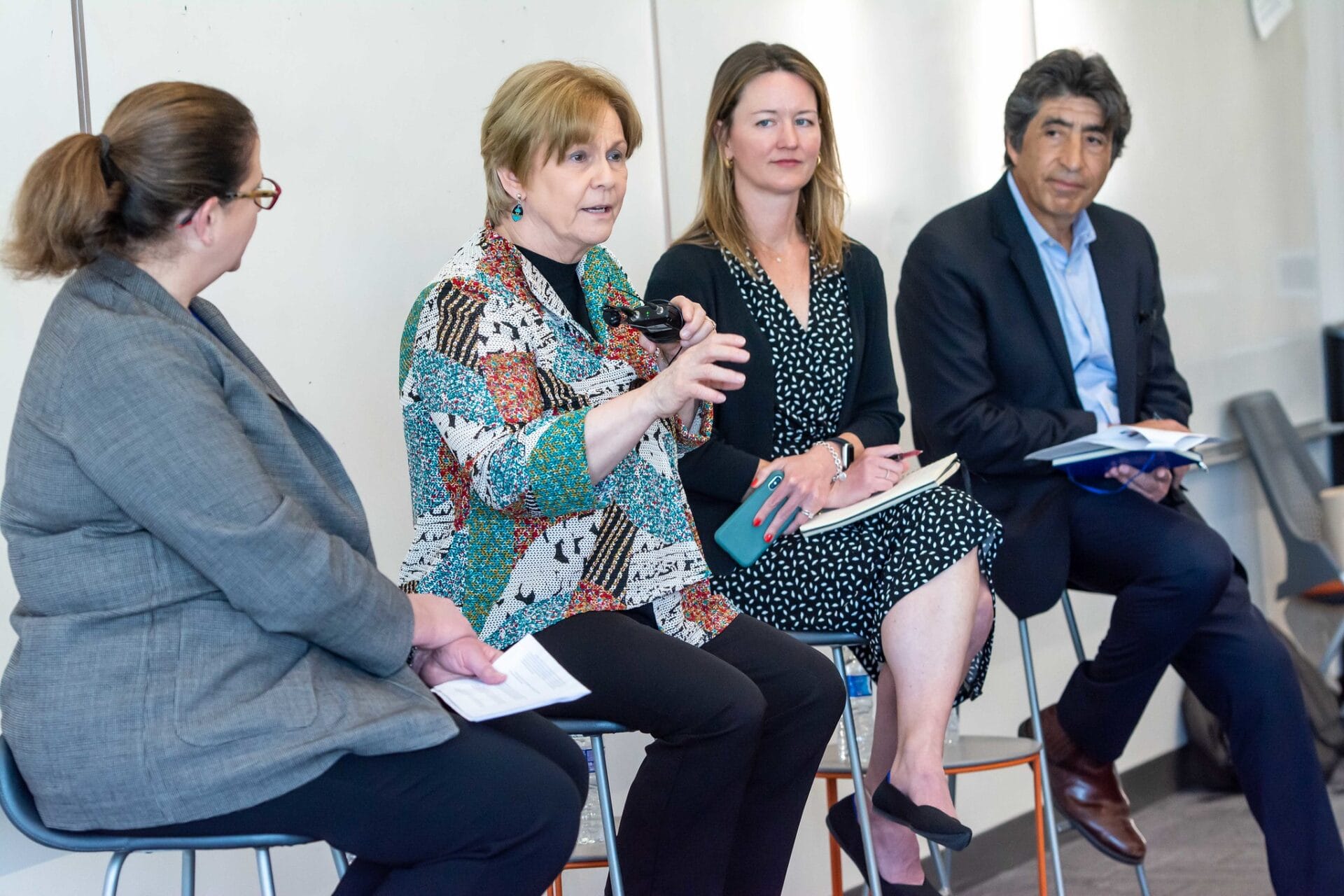Oxy CEO Meets with UT PGE Students
March 8, 2023
Oxy President and CEO Vicki Hollub — the first female leader of an American oil and gas company — met with about 100 students and faculty members from the Hildebrand Department of Petroleum and Geosystems Engineering on March 3.
In an hourlong open forum moderated by UT PGE Professor Carlos Torres-Verdín, UT Energy Institute Fellow Dana Harmon, and Alumna in Residence Karen Hagedorn (BSPE 1986), Hollub discussed Oxy’s strategy of investing in carbon capture and storage (CCUS) technologies to maximize production in existing reservoirs.
Becoming a Net-Zero Industry
“If we achieve our objective as a company and get the rest of the industry to want to adopt our [CCUS] model, then oil and gas will be viable and will be a continued part of the energy system for the next 60 to 80 years,” Hollub said. “If you’re injecting CO2 into a reservoir, you’re going to have a net-zero barrel of oil to sell that then creates net-zero jet fuel and other products — you can produce oil that’s net-zero or even net-negative.”
Recruiting Women in STEM
Hollub also discussed the importance of investing in communities where Oxy has a critical mass of employees; how students can stay on top of industry developments; and how to attract and retain women in the STEM workforce. Reflecting on meetings and conferences she attends where she is one of only two or three women, she emphasized that women bring “diversity of thought and approach” that is as important as “having diversity of ethnicity and diversity of experience” in a company. She advised starting early to recruit young women into STEM fields — “not just at the high-school level, but at the junior-high level” — and implementing policies designed to retain women in the workforce. “Most women leave the industry when they’re about mid-career or a little bit sooner — and that’s about the point where you want to be promoting women into leadership roles, not losing them.”
The Future for Petroleum Engineers
When asked about petroleum engineering students’ career prospects, Hollub underscored that engineers “drive the success” of oil and gas companies. “Technology has made the industry what it is today and that tech was driven by people who had ideas on how to do things better. You have that same opportunity to change the world by doing what you do in a way that is more meaningful, even if it’s a really small thing that becomes a bigger part of something,” she said. “You have a really good opportunity now because of the fact that the industry does have to [become net-zero]. If you’re change agents, if you like not doing things the way they’ve always been done, if you like to challenge things, you’re going to have a blast.”

Oxy President and CEO Vicki Hollub — the first female leader of an American oil and gas company — met with about 100 students and faculty members from the Hildebrand Department of Petroleum and Geosystems Engineering on March 3.
In an hourlong open forum moderated by UT PGE Professor Carlos Torres-Verdín, UT Energy Institute Fellow Dana Harmon, and Alumna in Residence Karen Hagedorn (BSPE 1986), Hollub discussed Oxy’s strategy of investing in carbon capture and storage (CCUS) technologies to maximize production in existing reservoirs.
Becoming a Net-Zero Industry
“If we achieve our objective as a company and get the rest of the industry to want to adopt our [CCUS] model, then oil and gas will be viable and will be a continued part of the energy system for the next 60 to 80 years,” Hollub said. “If you’re injecting CO2 into a reservoir, you’re going to have a net-zero barrel of oil to sell that then creates net-zero jet fuel and other products — you can produce oil that’s net-zero or even net-negative.”
Recruiting Women in STEM
Hollub also discussed the importance of investing in communities where Oxy has a critical mass of employees; how students can stay on top of industry developments; and how to attract and retain women in the STEM workforce. Reflecting on meetings and conferences she attends where she is one of only two or three women, she emphasized that women bring “diversity of thought and approach” that is as important as “having diversity of ethnicity and diversity of experience” in a company. She advised starting early to recruit young women into STEM fields — “not just at the high-school level, but at the junior-high level” — and implementing policies designed to retain women in the workforce. “Most women leave the industry when they’re about mid-career or a little bit sooner — and that’s about the point where you want to be promoting women into leadership roles, not losing them.”
The Future for Petroleum Engineers
When asked about petroleum engineering students’ career prospects, Hollub underscored that engineers “drive the success” of oil and gas companies. “Technology has made the industry what it is today and that tech was driven by people who had ideas on how to do things better. You have that same opportunity to change the world by doing what you do in a way that is more meaningful, even if it’s a really small thing that becomes a bigger part of something,” she said. “You have a really good opportunity now because of the fact that the industry does have to [become net-zero]. If you’re change agents, if you like not doing things the way they’ve always been done, if you like to challenge things, you’re going to have a blast.”